Back in Pera, Constantinople. Not much of consequence to write about lately, as I’ve been preparing for the newest addition to our family! It’s a bit unnerving to be preparing for this so far from home, but mother’s here are so greatly respected that I can’t help but feel some of that respect myself. On the hand though, women without children are really looked down upon. It seems it's better to be an unwed mother than a married woman without children!
The women go to extremes to prove that they are not past childbearing age and often kill themselves in the process. In fact, all the women I’ve met who have been married 10 years have close to 12 or 13 children each and when they’re pregnant, they pray for twins. I asked some of my friends here how they can care for so many children, they simply explain that many are likely die before growing up (which I guess does happen often). But they don’t seem to care, giving birth is enough to satisfy their vanity. I’m afraid I will remain very English in this area…
But now that I’ve discussed what you want to read about, I have to brag a little about the beautiful weather! I'm quite fond of the climate: while you huddle next to your heaters at home, I’m sitting in the sun, feeling the warm breeze, and enjoying fresh cut flowers from the garden. I’m also quite fond of certain aspects of Turkish law. Here, anyone convicted of lying is burnt on the forehead with a hot iron. I wonder how many English “gentleman” would have to grow their hair out if we adopted this practice at home… ;)
I’d say more but I must go see the midwife!
The court in Adrianople is amazing. The Grand Signor’s eldest daughter, Fatma Sultan, was married a few days before I arrived. She is the widow of the late Vizier who was killed at Peterwaradin. Fatma never actually lived with him, but when the Vizier died, all of his wealth became hers. When Fatma met Mosayp, who is about fifty years old, she burst into tears. Although he is a man of quality and is a favorite of the Sultan, it wasn’t enough to make him appealing in the eyes of Fatma, who is only thirteen years old.
As powerful as the Grand Signor is, he trembles before the Turkish army. The army has absolute power over the government. If, for example, the minister of state were spoken badly of in a coffeehouse, the whole place would be shut down because there are spies everywhere. However, if a minister displeases the people he is dragged out to the street and his hands, head and feet are cut off. I can’t help but wish that English Parliament would send a bunch of your passive obedient men so they can see arbitrary government in its strongest light!
Yesterday, I went with the French Ambassadress to see the Grand Signor’s passage to the mosque. He was led by many janissaries (these were horse and foot guards) who wore huge white feathers on their heads and were dressed in lively colors. From a distance they looked like a garden of tulips! After the janissaries was the Aga of the janissaries, dressed in a purple velvet robe, lined with silver, whose two well-dressed slaves led him by a horse. Next to Aga, was the Kuzlir Aga dressed in a yellow cloth and six more horses richly furnished were led after him. I won’t bore you with all of the details on the various dresses and turbans (which distinguishes their rank) but know that they were all extremely rich and happy. There really couldn’t have been a more beautiful procession.
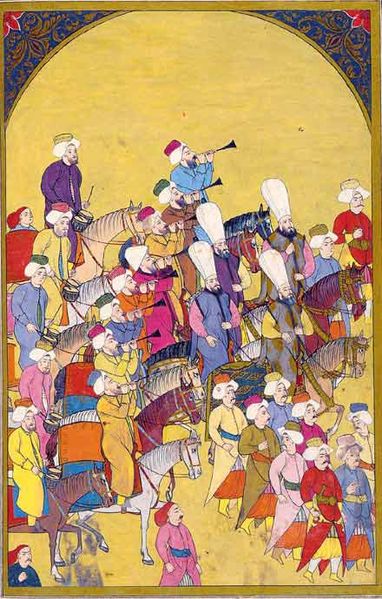 While this isn't exactly what we say, I thought it would help you guys get an idea! The music band of the Janissaries called mehterhane. They accompanied the company into battle and would play music according to the rhythm of the battle. The music was also used as a way of communication, such as retreat or attack. Ottoman miniature painting, from the "Surname-ı Vehbi" (fol. 171b). Topkapı Sarayı Müzesi, Istanbul. We also saw the Sultan, who looks about forty, and is very handsome and graceful. But his eyes are so full and black; there is something severe in his expression. He stopped under the window where we stood and looked at us very attentively.
I really can't stress enough the power the janissaries have in this country. I was having supper one night in a village on this side of Phillipopolis where our domestic guard met us. I asked for pigeons for my supper and one of my janissaries immediately ordered the cadi (the chief civil officer of the town) to send in some dozens. The poor man said he already sent some and couldn’t get any more. My Janissary immediately locked him up as a prisoner and out of respect to me, said he would punish him by my order, and if I wanted, he would bring me his head! This should show you the unlimited power these men have. The greatest man at Court speaks of them in a flattering tone only... But, I’ve said enough!
Welcome to my first post! I'm Lady Mary Wortley Montagu and I'm so excited to share my travels with all of you! Thank you for all of your emails and tweets! I'm in Belgrade now, about to set out to Adrianople and finally really begin my travels through Turkey!
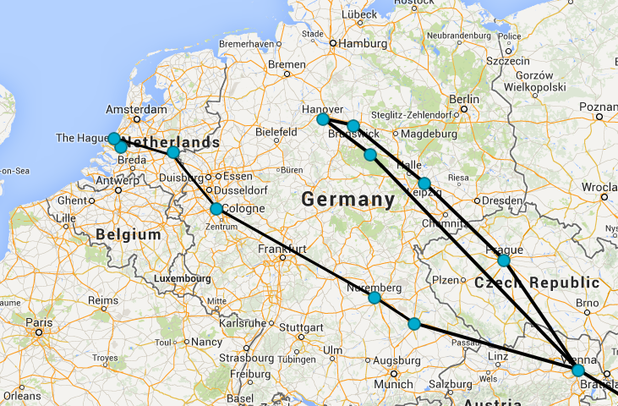 The first half of my trip around Europe! We stayed about 6 months before we headed on to Turkey! We first arrived in Rotterdam (see pics on twitter, @Lady_Mary_WM) and then traveled to The Hague, Cologn, and Nuremburg on our way to Vienna. The culture in Vienna is wonderful! I hate to say it, but I've strayed so far from the discipline of the church as to see an opera, Angelica's Victory Over Alcina by Johann Josef Fux, at the Garden of The Favorita and I LOVED it (don't judge me, Mr. Pope)! It was so dynamic and there were so many scene changes! Check out this short recording I did at the show!
In Vienna, I had a private audience with the Empress, (Elisabeth Christine of Brunswick-Wolfenbüttel) and spent time with the ladies at court. I have to tell you about the beauty of the Empress! Forgive my poetics, but even the all the words the poets have said of Juno and Venus could not measure up to her. She has the most amazing smile, fine hair, and perfect grace: even The Venus de' Medici was not more perfectly formed. Anyway, while I was visiting, I saw many ladies of the court and I have to say that fashion in Vienna is much different than England and France and much less practical. Women's hairstyles are a bit odd too. They build up their hair so high on their heads using piles of gauze and ribbon and cover it in powder and jewels to hide it. It seems far outside the realm of common sense, but even the Empress, as lovely as she is, must comply!
The only thing that's similar to our fashion in England is the petticoat, and that has ours outnumbered by a few yards . Sometimes the women just wear a scarf with anything they like underneath. Whenever the ladies feel like getting dressed up, they declare it Days of Gala and everyone comes over in their best outfits. They wear clothes embroidered in rich gold--but they don't seem to show much taste to them provided they are expensive! 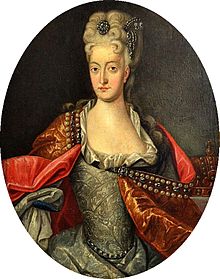 Portrait of Elisabeth Christine of Brunswick-Wolfenbüttel by Johann Gottfried Auerbach (1697–1753) One thing I do love about Vienna is the way the "older" women are treated. Here, a women of 35 is considered a young girl and is treated as young a beautiful! What a relief this would be to many young women in England who are already considered old maids; if only they had been born here instead! In Vienna, I was also encouraged to take a lover, though none of the women are coquettes or prudes. Here it seems that women are respected more based on the rank of their lovers than their husbands. It is quite common knowledge, even an expectation, that a women will take a lover; the ladies here couldn't understand why I would disgrace myself by not having a little intrigue. The women even control their lovers' estate and fortune. A young count even asked me to engage in a little affair of the heart! Obviously I said no, and had this happened in England, I would have been more offended but I spent enough time in Vienna to know that he was simply doing what he was obligated to do. "Gallantry and good breeding are as different in different climates as morality and religion" (66).
Marriage laws in Vienna are quite different from England, not that I know much about these things. Here it seems that dowries are limited to about 2,000 florins (about 200) and whatever money a woman possesses outside of the dowry is hers; her husband can't seize it or control what she does with it. As a result, many women end up wealthier than their husbands! But unfortunately, widows have no place in Vienna as they lose their rank when their husbands die.
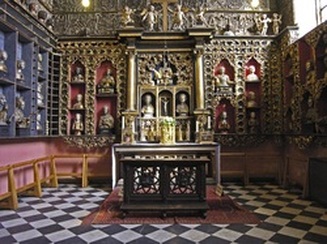 Basilica of St. Ursula's I know that you all expect to hear about the churches and convents. In Cologne, we toured the Basilica of St. Usrula's and it was beautifully decorated with rich images of saints, relics, and tons of pearls, diamonds, and rubies. I have to admit, I even found myself looking quite longingly at St. Ursula's pearl necklace…
In Vienna, I visited the convents, and St. Lawerence's was easily my favorite because of its ease and neatness. It seems much easier to live with than the nastiness and perpetual state of penance at the other convents. I couldn't help but laugh when they showed me a wooden head of our Savior that they swore spoke during the siege of Vienna (they said the open mouth was proof!). Here's a short video of the Chamber of the Bones in St. Ursula's, alleged to contain
the bones of martyred Princess and the 11,000 virgins who were massacred by the Huns (51). After all of this time in Vienna, we spent some time in Prague and Hanover, stopping at Leipzig and Brunswick in between. On the road to Leipzig I swear we almost died, the roads were so dangerous along the River Elbe. Mr. W slept through it all and I, being a good wife, didn't wake him. We barely stopped in Dresden, though I wish we could have stayed longer. The Saxon ladies as so affected, they would think it a mortal sin if they spoke or moved in a natural way.
In Hanover, the women are absolutely beautiful with rosy cheeks, snowy complexions, and coal black hair. The opera house too is much finer than the one in Vienna. We saw the Herrenhausen Gardens which were covered in snow, but still beautiful! There were so many orange trees! A brief video of the gardens We traveled back to Vienna and attended a carnival. Because of the war with the Turks, we weren't allowed to wear the typical carnival masks. We eventually left Vienna and arrived in Gyor, Hungary. For a long time, Gyor was the frontier between the Turkish and German empires. The Turks tried to conquer it many times, sometime successfully, but in the end, the Germans regained control. We continued our travels through beautiful and fruitful plains between Nosmuhl and Buda, but most of the region remains like a desert because of the long war with the Turks and the Emperor. Even worse were the towns of Adam and Fodowar, which are largely forest-like; this part of the country was better off when the Turks ruled. Because it's so little frequented, it was surprising to see the vast number of wild fowl, "which often live here to a good old age and undisturbed by Guns in quiet Sleep."
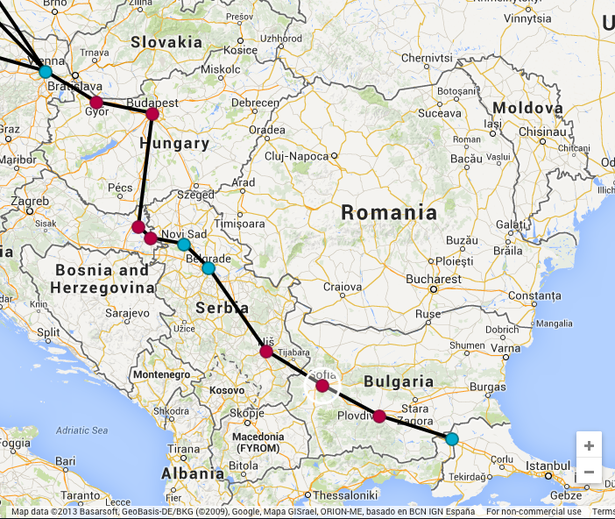 The second half of my journey to Turkey! We took our time and traveled cross-country from Vienna to Belgrade, and soon I'll be in Adrianople! We then passed through Mohatch, Danube, Esseek, and finally Bocowar where we waited until everything was clear concerning our crossing into the Turkish frontier. We were promised by General Bassa Seraskier to be well received in Turkey! We were told that we would be escorted by a Turkish convoy in Betsko, a village between Peterwaradin and Belgrade. When we finally arrived in Betsko, we were met by Turkish soldiers and then made our way to Belgrade. Belgrade is a strong city conquered by the Grand Vizier and strengthened by the numerous garrisons of the bravest soldiers who are commanded by the Bassa. Franky, I did not feel very comfortable here. We were expecting to leave in one night but the Bassa had detained us until he received orders from Adrianople.
Fortunately, we stayed in one of the best houses here and I made friends with our host, Achmet-Beg, whose father was a great Bassa. He dined with us every night and drank wine freely. He was so happy with the liberty of conversing with me; he explained to me some pieces of Arabian poetry, which are generally written in alternate verse, and are rather musical. Their expressions of love were so passionate and lively, and I noticed they were not so different from our own English poetry! I impressed Achmet-Beg by retelling some of the Persian tales that I know. He has such wit and is much more polite than many of our own Christian men back home.
However, these amusements did not hinder me from wanting to leave this place. I'll be leaving Belgrade for Turkey tomorrow. Make sure to follow me here on the blog and my on Twitter @Lady_Mary_WM to stay updated on my adventures in Turkey! *This post references letter 1-25 of The Turkish Embassy Letters, see the full-text here*
|





 RSS Feed
RSS Feed